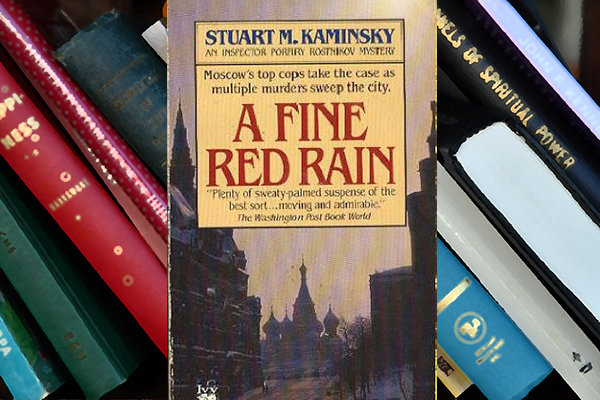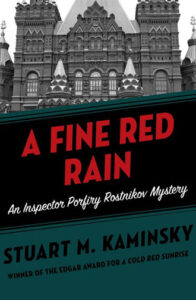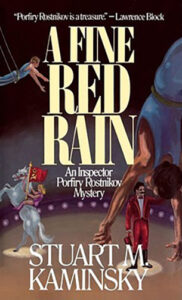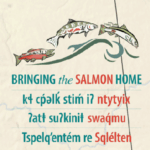Home »

One of mystery genre’s most intriguing characters
Book Review
By Derryll White
Kaminsky, Stuart M. (1987). A Fine Red Rain.
 Inspector Porfiry Petrovich Rostnikov, “the Washtub,” is one of the most intriguing characters in the mystery genre.
Inspector Porfiry Petrovich Rostnikov, “the Washtub,” is one of the most intriguing characters in the mystery genre.
He constantly struggles with the deceptive and minor lackeys of the Politburo just prior to the emerging true evils of the Putin era. The Inspector talks with Gogol, the dead Ukrainian literary genius. Once a hero in the great war against Fascism, Rostnikov now limps through Moscow resolving crimes, infuriating the KGB and revealing a constant love and respect for the common Russian people.
Inspector Rostnikov is supported in his various undertakings by two other characters, Sasha Tkach and Emil Karpo. Sasha is young, innocent, a protege of the Washtub. He is learning of the grinding pressures of the State on people he believes to have real value, however misguided they may be. Emil Karpo is referred to as The Vampire.
To Karpo, Russia means sacrifice, playing his part in the Revolution. He has unbending will, intelligence, and is a deadly and methodical stalker of criminals. The Washtub often has to save him from the political chaos Karpo creates while chasing criminals through the multiple layers of Russian bureaucracy.
Someone is killing the stars of the Moscow circus – and it’s up to Rostnikov to stop the bloody show. He proceeds in a most unorthodox fashion. Stuart Kaminsky wrote 16 Rostnikov novels between 1981 and 2010, a significant piece of his literary output of 63 novels and 11 non-fiction books.
He received the Grand Master Award from the Mystery Writers of America and influenced many writers, including Sara Paretsky who dedicated her first V.I. Warshawsky novel to him.
********
RUSSIA – To Karpo, Russia meant sacrifice. The revolution was far from over, might never be over. There was only the struggle, the dedication, the small part one could play in the bigger picture. There wasn’t necessarily a victory to be achieved. Life was a series of tests, challenges, that one was either prepared for or would be worn away by. Since hardship was inevitable, it was best to condition oneself to it. Discomfort was welcome. Pain was the ultimate test. A weak individual could not function. There was a way in which one lived, as Lenin had lived.
ILLUSIONS – “Yes,” Mazaraki said, laughing, as he followed behind him. “It all makes sense. The pig is a figure of the farm economy, delicately balanced to serve the needs of the people by the skill of the Soviet farmer, who can juggle, balance, perform near-miracles of skill. It also demonstrates the level of specialized skill Soviet society can nurture, admire, and protect.”
“It is fascinating,” said Rostnikov, coming to the arena exit door. “But it makes little sense.”
He turned to face the larger man, who worried his mustache with his fingers and cautiously examined this rather strange policeman. Then the bigger man grinned and shook his head as he whispered, “Perhaps you are right, but it would be just as well to protect illusions. The illusions of adults are as important as the illusions of children. I trust that this conversation is between us alone.”
THE PEOPLE – Though it displeased him, Karpo had long since learned to accept incompetence and lack of dedication among the police, as he had learned to accept it among shop clerks, street cleaners, office workers, everyone. There was nothing wrong with the various economic and revolutionary plans that had been put forth to move the Soviet Union forward. The problem lay in the lack of discipline of the people, not all the people, but too many people: the very old, who were corrupted by memories of life before the revolution, and the young, who were corrupted with visions of tempting sloth in France and the United States.
 – Derryll White once wrote books but now chooses to read and write about them. When not reading he writes history for the web at www.basininstitute.org.
– Derryll White once wrote books but now chooses to read and write about them. When not reading he writes history for the web at www.basininstitute.org.








